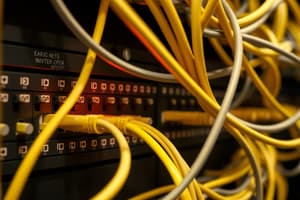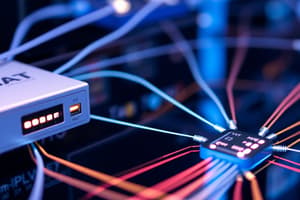Podcast
Questions and Answers
Which of the following is NOT an advantage of using computers?
Which of the following is NOT an advantage of using computers?
- Computers can work continuously for long periods.
- Computers can make decisions independently. (correct)
- Computers can perform complex operations quickly.
- Computers can process large volumes of data.
What is a common characteristic of the Second Generation of computers?
What is a common characteristic of the Second Generation of computers?
- Employed artificial intelligence.
- Used vacuum tubes for processing.
- Operated on binary language exclusively.
- Introduced integrated circuits. (correct)
Which statement about computer generations is true?
Which statement about computer generations is true?
- Fifth Generation computers are currently non-existent.
- Fourth Generation computers started developing in 1972. (correct)
- First Generation computers were known for their use of microprocessors.
- The Third Generation lasted from 1955 to 1963.
Which of the following is a disadvantage of computers?
Which of the following is a disadvantage of computers?
What is a key feature of the Fifth Generation of computers?
What is a key feature of the Fifth Generation of computers?
What is one of the capabilities of computers that allows them to outperform humans in certain tasks?
What is one of the capabilities of computers that allows them to outperform humans in certain tasks?
Which generation of computers is characterized by the use of integrated circuits?
Which generation of computers is characterized by the use of integrated circuits?
What is a significant limitation of computers as outlined in the disadvantages section?
What is a significant limitation of computers as outlined in the disadvantages section?
Which of the following is not mentioned as an advantage of using computers?
Which of the following is not mentioned as an advantage of using computers?
What distinguishes the Fifth Generation of computers from earlier generations?
What distinguishes the Fifth Generation of computers from earlier generations?
During which time period did the First Generation of computers primarily operate?
During which time period did the First Generation of computers primarily operate?
Which of the following capabilities is NOT a reason computers increase curricular performance?
Which of the following capabilities is NOT a reason computers increase curricular performance?
What is a common error made regarding the nature of computers?
What is a common error made regarding the nature of computers?
What does the evolution of computer generations indicate?
What does the evolution of computer generations indicate?
Which of the following statements best summarizes the reliance of computers on humans?
Which of the following statements best summarizes the reliance of computers on humans?
Flashcards are hidden until you start studying
Study Notes
Advantages of Computers
- Perform complex operations rapidly, significantly reducing processing time.
- Capable of handling large volumes of data efficiently.
- Operate continuously for extended periods without fatigue.
- Execute multiple tasks simultaneously, such as streaming media and gaming.
- Minimize human error, providing accurate results in computations.
- Enhance learners' academic performance through various educational tools.
Disadvantages of Computers
- Lack independent decision-making ability due to absence of a brain.
- No inherent intelligence; relies entirely on programmed instructions.
- Unresponsive to emotions or human experiences.
- Require a constant power supply to function.
- Dependent on human input for operation; cannot initiate actions autonomously.
Generations of Computers
-
Classification based on the primary devices used and changes in architecture and operational modes.
-
Features and functional capabilities have evolved from the first generation to modern computers.
-
Divided into five generations, each marked by technological advancements:
- First Generation (1945-1955)
- Second Generation (1957-1963)
- Third Generation (1964-1971)
- Fourth Generation (1972 onward)
- Fifth Generation (Present and future)
Advantages of Computers
- Perform complex operations rapidly, significantly reducing processing time.
- Capable of handling large volumes of data efficiently.
- Operate continuously for extended periods without fatigue.
- Execute multiple tasks simultaneously, such as streaming media and gaming.
- Minimize human error, providing accurate results in computations.
- Enhance learners' academic performance through various educational tools.
Disadvantages of Computers
- Lack independent decision-making ability due to absence of a brain.
- No inherent intelligence; relies entirely on programmed instructions.
- Unresponsive to emotions or human experiences.
- Require a constant power supply to function.
- Dependent on human input for operation; cannot initiate actions autonomously.
Generations of Computers
-
Classification based on the primary devices used and changes in architecture and operational modes.
-
Features and functional capabilities have evolved from the first generation to modern computers.
-
Divided into five generations, each marked by technological advancements:
- First Generation (1945-1955)
- Second Generation (1957-1963)
- Third Generation (1964-1971)
- Fourth Generation (1972 onward)
- Fifth Generation (Present and future)
Studying That Suits You
Use AI to generate personalized quizzes and flashcards to suit your learning preferences.




